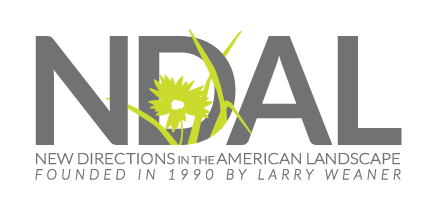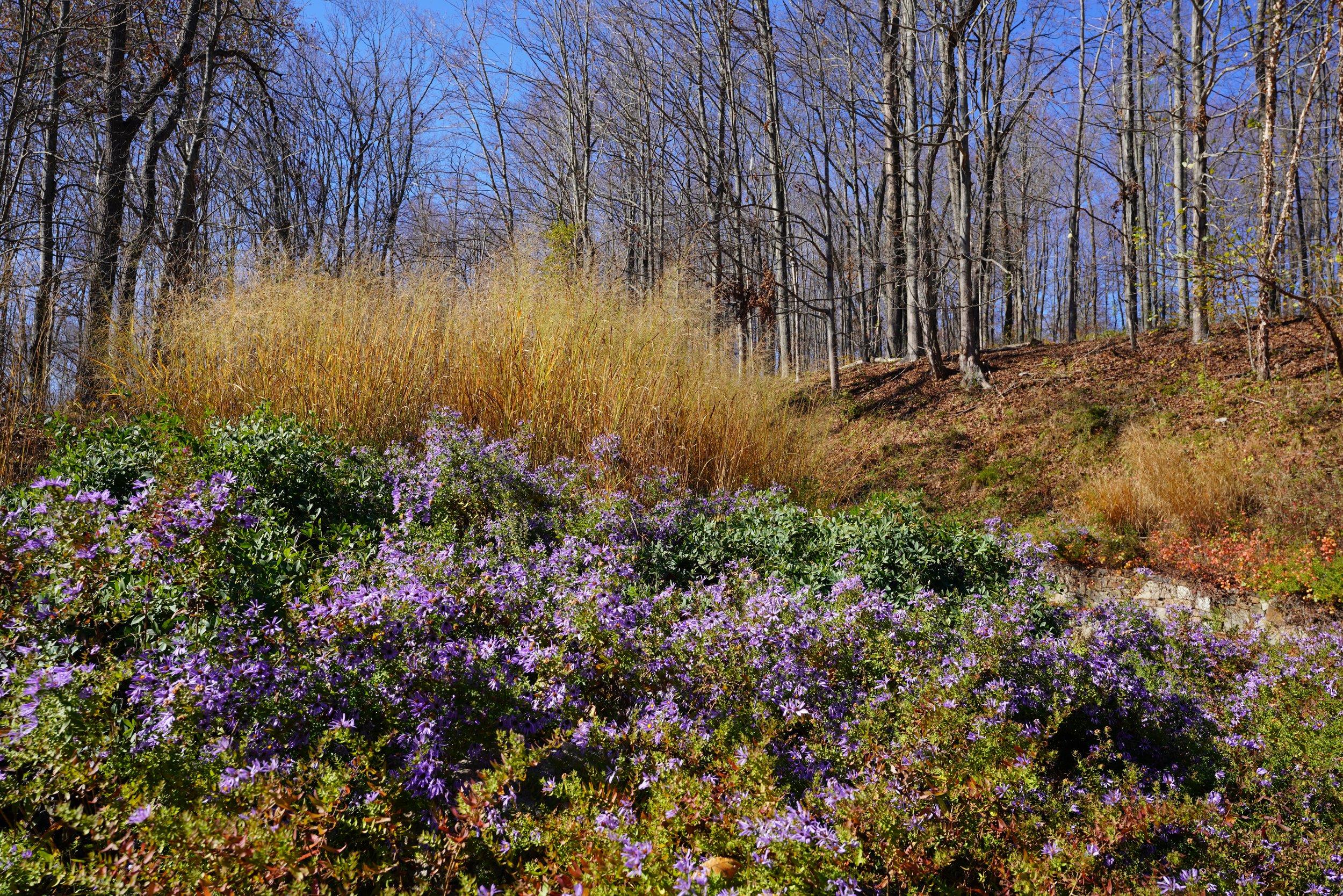Photo by Larry Weaner Landscape Associates
One of the key challenges for landscape practitioners is dealing with invasive species. When discussing solutions with clients, the use of herbicides can be an elephant in the garden room. In Part One of this series, we'll examine and debate the ecological and practical ramifications of both chemical and organic approaches. In Part Two, project case studies will demonstrate specific planting and management techniques for each. Regardless of the path you choose, this program will enhance your ability to "referee" plant populations in your projects more effectively.
Or scroll down for session details
Registration will be open and recordings will be viewable for 3 months after each live session date.
CEUs available (APLD & LA CES - 6 CEUs) - 3 class hours per session
See here for CEU details and instructions
Student Scholarships & Wild Ones member discounts available! Scroll down below the session descriptions list for details.
“An amazing wealth of knowledge!”
-John F., 2023 Intensive Course Attendee
Photo by Larry Weaner Landscape Associates
To Spray or Not to Spray?
Controlling Invasive Plants
Part One: Brian O’Neill & Paul Tukey
with a Panel moderated by Larry Weaner
Lecture: Pesticides and the Precautionary Principle
Paul Tukey
“Our common future, that of every Canadian community, depends on a healthy environment.” With those words at the start of what is considered one of the most environmental court decisions in world history, Supreme Court Justice Claire L’Heureux Dube effectively crushed the synthetic pesticide application industry in her country in 2001. The judge involved the “precautionary principle,” a better-safe-than-sorry approach to regulating toxic lawn and garden products. Journalist Paul Tukey has studied that case and its implications — both in public opinion and landscape practice — for nearly 30 years. Now serving as the Director of Environmental Stewardship at the renowned Glenstone Museum in Maryland, Paul developed pesticide-free protocols 13 years ago that are now deployed across 350 acres. He’ll let us know what he has found.
Lecture: The Benefits of Herbicide Use as Part of an Integrated Weed Management Program
Brian O’Neill
Since 1973 Brian O’Neill has been controlling invasive species throughout the Mid-Atlantic and Mid-Western states. In this presentation he will discuss his views on the effects of herbicide use on people, wildlife, and the environment overall. He will also illustrate some of the specific ways that herbicides can be used selectively, and in conjunction with other weed control actions to limit their use and maximize their effectiveness. Brian will also cover herbicide use as part of site preparation and ongoing maintenance of native meadows.
Panel
Brian O’Neill & Paul Tukey, moderated by Larry Weaner
Brian and Paul will discuss the implications of herbicide versus organic approaches to invasive plant control. This conversational panel will be moderated by Landscape Designer Larry Weaner. They will also take questions from the audience.
Thursday, December 21, 2023 | 1:00 - 4:30 PM ET
Instructor Bios:
Brian O’Neill has been licensed and treating wetlands and aquatics sites for well over 35 years. Upon graduation in 1973, Brian first job was with Weeds, Inc. and he is now President. Weeds, Inc. specializes in weed control, both contact and herbicide sales. They work throughout the Mid-Atlantic and Midwestern states. Brian is a licensed applicator and a consultant in multiple states. Over the past 25 years, Weeds, Inc. has been planting native warm season/cool season grass and wildflower mixes on various projects throughout the Mid-Atlantic states. Weeds, Inc. has coordinated with many corporate clients to help get their facilities Leed Certified by way of installing low maintenance flora. Brian O’Neill has a BSBA degree from American University in Washington D.C.
Paul Tukey is an award-winning journalist, author, filmmaker, HGTV host, consultant and motivational public speaker who is internationally recognized as a pioneering leader in sustainable landscaping. Now serving as the Director of Environmental Stewardship for the Glenstone Museum in Potomac., Md., Paul is helping to create a “living classroom” on the all-organic 300-acre site that includes native meadows, a five-acre organic lawn, restored streams and tributaries, forests and more than 13,000 newly planted native trees.
Larry Weaner, FAPLD, founded Larry Weaner Landscape Associates in 1982 and New Directions in the American Landscape in 1990. His nationally recognized work combines horticulture, landscape design, and ecological restoration, and spans more than twenty U.S. states and the U.K. He has been profiled in national publications. His book, Garden Revolution: How Our Landscapes Can Be a Source of Environmental Change (Timber Press, 2016) received an American Horticultural Society (AHS) Book Award in 2017. In 2021 he received the AHS Landscape Design Award and the Association of Professional Landscape Designers (APLD) Award of Distinction.
To Spray or Not to Spray?
Controlling Invasive Plants
Part Two: Larry Weaner
In 40 years of landscape interactions Larry has encountered numerous weed species in a plethora of vegetative compositions. In this presentation he will share some of his experiences through a series of detailed case studies that illustrate both chemical and organic protocols for controlling invasive species. He will also discuss how piggybacking weed control efforts onto natural ecological processes can significantly reduce or eliminate the need for chemical herbicides. Landscapes displayed will range in scale from estate to suburban, and will show how weed control efforts played out over long periods of time, some well over 20 years.
Friday, December 22, 2023 | 1:00 - 4:30 PM ET
Instructor Bio:
Larry Weaner, FAPLD, founded Larry Weaner Landscape Associates in 1982 and New Directions in the American Landscape in 1990. His nationally recognized work combines horticulture, landscape design, and ecological restoration, and spans more than twenty U.S. states and the U.K. He has been profiled in national publications. His book, Garden Revolution: How Our Landscapes Can Be a Source of Environmental Change (Timber Press, 2016) received an American Horticultural Society (AHS) Book Award in 2017. In 2021 he received the AHS Landscape Design Award and the Association of Professional Landscape Designers (APLD) Award of Distinction.
Photo by Larry Weaner Landscape Associates
“As always, these presentations are excellent and offer so much important and practical information. Very useful.”
“I loved it all! My brain was definitely on fire with ideas and how to apply them into my practice.”
Registration & NDAL Events Portal
When registering on the NDAL Events Portal you will be asked to either sign into your existing account or create one. This account will give you exclusive access to the session recordings and course materials. These materials will be available until three (3) months after the live event dates.
To register multiple staff members at once, please email info@ndal.org with their full names, email addresses, and session title(s). We can then register them and send an online invoice for payment.
Students please email verification of student status (ie. course schedule, student ID) to info@ndal.org for student discount code.
Wild Ones members please email verification of member status to info@ndal.org for discount code.
Registration will be refunded only if notification is received before ten (10) working days prior to the live event date less a $10 processing fee.
Student Scholarships | Free Attendance
Students and recent graduates are invited to apply for scholarships granting free registration to the sessions. Two scholarships per session will be awarded.
Eligibility: Current undergraduate/graduate student or matriculation in 2023.
To apply: Please submit no more than 1 page description of why you’re interested in the particular session you’re applying to attend, and your resume. You are welcome to list multiple sessions as your next choices.
Due date: Applications taken on a rolling basis until filled. You are also welcome to apply after a live session date to view the recording.
To apply: Please email your letter and resume to Sara Weaner Cooper, NDAL Executive Director, at sweaner@ndal.org.
“I keep coming back. Haven’t been disappointed yet.”
Questions? Please contact:
Sara Weaner Cooper
Executive Director
New Directions in the American Landscape
sweaner@ndal.org
510-518-0430
Photo by Larry Weaner Landscape Associates




